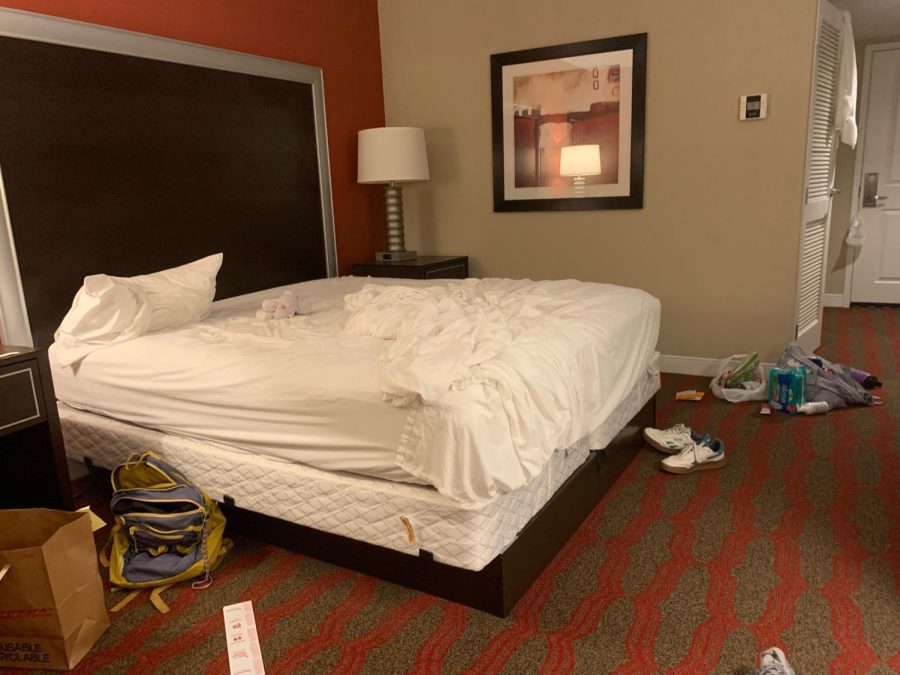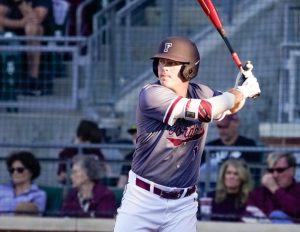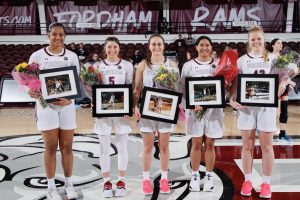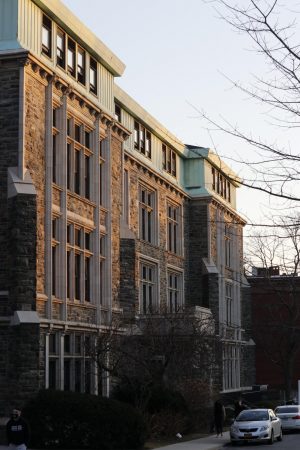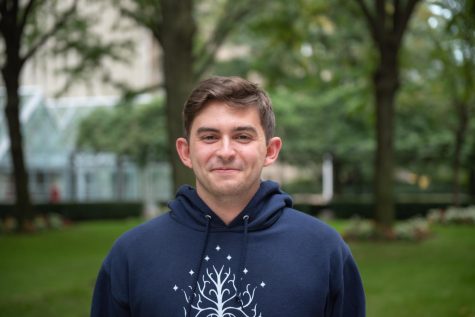Students Recount Hotel Quarantine Experiences
NYC’s free COVID-19 Hotel Program yields positive and negative feedback regarding rooms, cleanliness and food
COURTESY OF MARIA AKOSTA GKALINTO
A room in the LaGuardia Plaza Hotel where quarantining individuals received a free stay and meals with the COVID-19 Hotel Program.
March 4, 2022
For Juliana Castello, Fordham College at Lincoln Center ’24, the king-sized bed in her LaGuardia Plaza Hotel room was a comfortable place to complete her finals while in isolation last semester. She said it repeatedly, careful not to complain; the bed was comfortable, the staff was kind and the food was acceptable. There were worse places to isolate while recovering from COVID-19, and it was all free of charge.
Castello remembered the experience optimistically, imagining the ways in which her stressful December could have gone differently. One of the few things she couldn’t look back on fondly was the view from her window at night. Looking down on East Elmhurst in Queens, she could see rows and rows of houses lit up by twinkling Christmas lights. Her friends were in Manhattan, and her family was thousands of miles away in Brazil.
“I got so sad a few times because they are having Christmas things, and I am in here, and there is nothing I can do about it,” Castello said.
City residents who test positive qualify for the program if their homes lack space for social distancing, if they share rooms or bathrooms, or if they live with someone who is vulnerable.
According to New York City guidelines, the COVID-19 Hotel Program was created to provide COVID-positive individuals with a secure location to isolate themselves. City residents who test positive qualify for the program if their homes lack space for social distancing, if they share rooms or bathrooms, or if they live with someone who is vulnerable.
Because a significant number of college students live with roommates, many in the Fordham community qualify, and some have found the program to be an attractive option. Along with a free stay in a hotel room for up to 10 days, the city also offers isolating individuals three meals per day, medical assistance and transportation to and from the hotel via a rideshare service.
When Castello tested positive in December, she received a call from Fordham Public Safety giving her the option of isolating on campus or leaving the premises in an hour and 15 minutes or less. Her home was a continent away, which left her with few places to go.
“Some students chose to use the NYC Hotel Program for their isolation period.” Maureen Keown, director of University Health Services
University Health Services Director Maureen Keown stressed that students who cannot go home to isolate themselves have options at Fordham and elsewhere.
“Those who cannot go home can isolate on campus in one of the isolation rooms set aside by Residential Life,” Keown said. “Some students chose to use the NYC Hotel Program for their isolation period.”
At Fordham’s Lincoln Center campus, Director of Residential Life Gregory Jones said that the school does everything it can to provide students with a “safe, healthy and comfortable” isolation experience. Students are kept in a section of McMahon Hall with other isolating students, and those with a meal plan can have food delivered to their rooms. Clean linens are also provided.
Castello and her family had concerns about Fordham’s program, primarily a lack of 24-hour care and a delayed approval process for grocery delivery. She may have also had to share a space with another COVID-19-positive student. She contacted the city soon after and was transported from Fordham within Public Safety’s deadline.
There was a one-day waiting period for her to get approved, but she spent that night in another free hotel room. Though the initial stages of her isolation were stressful, she described the overall NYC COVID-19 Hotel Program experience in positive terms.
“The quarantine process was really calm and relaxed,” Castello said. “I could not recommend that service enough.”
Though she was unfailingly complimentary of the city’s program as a way to provide a safe space for isolation, Castello still struggled at certain points in the LaGuardia Plaza Hotel. Loneliness and a lack of human contact were constant obstacles, especially around the holidays.
“It was like jail.” anonymous student who tested positive in February
Another student, who asked to remain anonymous to keep their medical history private, also stayed at the LaGuardia Plaza for five days in February and described the experience in more negative terms.
“It was like jail,” the student said.
For this student, who lives off campus in the Bronx, the city’s hotel program was one of the only ways they could ensure that their entire apartment was not exposed. They never considered Fordham’s on-campus isolation program as a legitimate option.
After packing clean clothes, healing crystals, a yoga mat, two books and “a ton” of cold medicine, they set off for their five-day stay in Queens. The cold medicine was gone after two days, leaving them with rose quartz and whatever the hotel’s makeshift pharmacy could provide to get them through the rest of isolation. The yoga mat proved useless in a room dominated by two queen-sized beds.
“Walking in, I thought that the place was so big, and then I did not have any room,” they said.
“I only went outside once, and everyone who went outside went outside to smoke.” Juliana Castello, FCLC ’24
At the LaGuardia Plaza, the student identified outdoor time as one of the few “exciting” moments of the day, facetiously describing the opportunity to leave as “crazy fun.” Isolating individuals could go outside three times a day for 15 minutes, and after the first day, they quickly identified the purpose of this recreational time. For many in the hotel, it was a smoke break.
Castello also mentioned outdoor time during her December stay and associated it with an opportunity for those isolating to smoke. On one hand, she praised the efforts of those running the program for accommodating people grappling with substance dependencies. On the other hand, it was cold, and she doesn’t like cigarette smoke.
“I only went outside once, and everyone who went outside went outside to smoke,” Castello said. Staying indoors seemed preferable to her from that point on.
“My mental health obviously was not great when I am forced to isolate without being in contact with my friends.” anonymous student
The anonymous student also claimed that conditions within the hotel itself were not always optimal. While the room felt safe in terms of sterilization for COVID-19, they reported seeing mold in the shower. The quality of the food, which was served promptly three times per day, was also an issue.
“It was always lukewarm when it was supposed to be warm, or if it was supposed to be cold, it would somehow still be lukewarm,” the student said.
Though Castello didn’t explicitly insult the quality of the food, she did admit to mixing and matching food in her mini-refrigerator to make meals more exciting. Both students also had food delivered to the hotel during their stays.
Unlike Castello, who was isolated in the hotel during finals, the anonymous student had to take classes while isolating in February and struggled to do so. For one, they experienced symptoms at the beginning of their stay, which impacted their ability to complete assignments. But after reaching out to five professors requesting hybrid classes, only three agreed to accommodate them and one never responded.
The student said that they were unable to attend 10 classes in person and missed four completely due to the lack of a hybrid option. After testing positive on Feb. 4, they claimed that they still felt behind in some classes over Presidents’ Day weekend.
“It was just so much to do,” the student said. “Also, my mental health obviously was not great when I am forced to isolate without being in contact with my friends … Just trying to be very gentle with myself, and because of that, I missed quite a few readings.”
To make the situation even more complicated, the student was also let out of isolation after five days despite still testing positive for COVID-19 on a rapid antigen test. Their isolation was completed in accordance with Centers for Disease Control and Prevention and state guidelines, which state that someone can leave quarantine after five days as long as they have been asymptomatic or without a fever for 24 hours. Individuals who leave quarantine after five days are then instructed to wear a mask around others for the next five days.
“I feel like I do not want to complain about it (the program) because again, it was free.” anonymous student
Fordham’s guidelines, however, require a negative antigen test to test out of quarantine early. Without a negative test, the student was still not allowed on Fordham campuses for the remainder of that week.
Though their experience in the hotel was negative, they echoed Castello’s sentiments of gratitude that the option was available to them.
“From the Uber picking me up to the Uber taking me back, I did not pay anything … I feel like I do not want to complain about it (the program) because again, it was free,” the student said.
Because she exited isolation after the fall semester ended, Castello did not have to attempt to reenter Fordham until January. In the meantime, her mother traveled from Brazil to spend time with her during her isolation. After a week at the LaGuardia Plaza, Castello joined her mother in the Marco LaGuardia Hotel for Castello’s final three days in isolation. They spent Christmas in their room.
“It was nice to actually be with her after such a stressful semester and stressful couple of weeks.” Juliana Castello
“It was nice to actually be with her after such a stressful semester and stressful couple of weeks,” Castello said.
After 10 days, Castello finally cleared isolation protocols and returned home to Brazil in time to celebrate New Year’s Eve with loved ones. She returned to Fordham without issue this semester.
Though COVID-19 cases in the city have decreased since January, students who test positive may still be eligible for the program if they meet the requirements.
Students who have COVID-19 and are interested in quarantining in a free hotel can call 311 or 1-844-692-4692 between the hours of 9 a.m. and 9 p.m.

